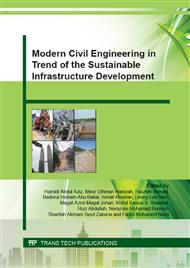p.634
p.640
p.649
p.655
p.661
p.668
p.676
p.682
p.688
Rethinking Sustainable Housing Maintenance Delivery
Abstract:
The concerns for climate change, population explosion, environmental degradation, pollution, and resource depletion have led to the quest for sustainable buildings. Building maintenance is able to contribute to sustainability by curtailing noxious gases to the lowest minimum, reduction of emission, optimize energy, avoid leakage, and waste, as well as enhancing the reliability, durability and availability of buildings. However, consideration of sustainable practice in residential buildings is low due to a poor understanding of the meaning of maintenance and lack of motivation by building users. This study aims to create awareness on the roles of housing maintenance towards sustainability by evaluating the sustainability credentials of current maintenance practices and to contextualise the Maslow’s Hierarchy of need to motivate homeowners’ towards sustainable maintenance practice. This is important because to investigate sustainable maintenance behaviours and to implement sustainable maintenance practice, the motivations of the users need to be identified. Primary data is collected through survey questionnaires. Data obtained were analysed through descriptive statistics. The results of the findings led to the conclusion that in order for the housing sector to be a solution of sustainable development, the maintenance of the building required rethinking. A salient finding within the study is that sustainable building maintenance is driven by the market, ethics and legislation.
Info:
Periodical:
Pages:
682-687
DOI:
Citation:
Online since:
October 2015
Authors:
Price:
Сopyright:
© 2015 Trans Tech Publications Ltd. All Rights Reserved
Share:
Citation:


